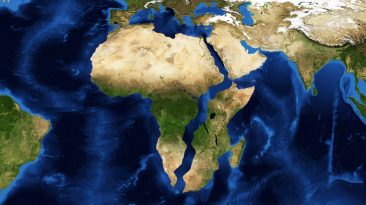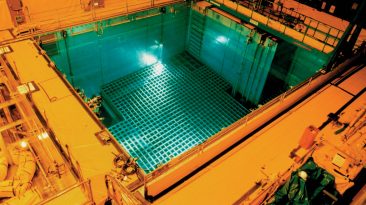On average, you produce just over 2 kgs (4.4 lbs) of waste each day. That may not sound like a whole lot, but multiply it by every person on Earth, and suddenly you’ve got 14.8 billion kgs (32 billion lbs) of waste being produced every 24 hours. Not just things that go in the garbage, but recycling as well.
But what would happen if we suddenly stopped recycling? Would the world be quickly flooded with garbage? Would we fire it into space?
Here’s what would happen if everyone stopped recycling.
Nearly everything we buy has some recyclable component. Glass, p aper, plastic, metal and other materials. The United States recycles about 65 million tons of waste each year, which is just about 30% of it’s 200 million tons of yearly waste.
Around the world, recycling is a massive industry. Countries in Europe like Austria and Germany recycle over 50% of their waste every year.
Now, what would happen if everyone on the planet just decided to stop?
If the world stopped recycling, every single scrap of waste would end up in a landfill. Well, most of it. With a larger amount of trash, it’s inevitable that we’d get more in places where it shouldn’t be.
[dx_custom_adunit desktop_id=”RTK_CDE4″ mobile_id=”RTK_SUFd”]At first, you probably wouldn’t notice anything. In a best-case scenario, most landfills around the world expect to last 30 to 50 years. One of America’s largest landfills began accepting garbage back in 1957 and finally stopped in 2013. That’s 56 years of trash!
It may take a couple years, even decades, before garbage starts piling up everywhere. So what happens when those landfills finally fill up?
When landfills become too full to take any more garbage they’re covered with clay and soil to form large hills. You might think the job is done at that point; that you’ll never need to think about that stinky garbage ever again! But sadly, that isn’t the case.
While the garbage is tightly packed underground it remains in an oxygenless environment. There it creates methane gas, a huge contributor to global warming. Landfills are the third largest producers of methane gas in the world.
As the planet’s landfills continue to fill, they have the potential to eclipse farming and fossil fuel production and become the highest producers.
With our landfills full, where would the rest of our garbage go? Well, we wouldn’t blast it up into space — that’s far too expensive. Instead, we’d most likely burn it, a practice some European countries are currently doing.
However, if every landfill did this it would create even more potentially deadly pollution, making the air we breathe toxic. Recycling prevents almost 200 million metric tons of greenhouse gases from polluting our environment each year. That’s equivalent to the fumes produced by over 39 million cars on the highway.
Our trash would also end up in even more places where it’s not supposed to go – like the ocean. Right now, the world’s oceans are home to millions of floating pieces of plastic. With no one recycling, even more of this debris would end up in the water, killing millions of fish and making the water unswimmable.
But these might be the least of our worries, at least in the short term. What we would start to notice quickly would be our natural resources being destroyed. You see, recycling isn’t just about keeping trash out of landfills. It also helps us sustain our natural resources, like timber.
It’s estimated nearly 7 billion trees are cut down globally each year. In 2017, the United States recycled over 68 million tons of paper. Without this, more trees would have be cut down to sustain the paper supply, leading to an even higher amount of deforestation than we have today.
You can say goodbye to fossil fuels. In addition to making our cars go, they’re the source of all our plastic products. Fossil fuels are currently expected to deplete by 2050 but without recycling, fossil fuel consumption would be higher than ever leading to the precious resource being gone much sooner.
So with no one recycling the world would have no choice but to change. New water bottles being researched today are made out of biopolymer, a material that’s composed of bacteria. These bottles are designed biodegrade in just 18 months.
That would help a lot, as the world is currently using over a million plastic water bottles per minute..
Other materials and products would eventually have to follow suit, or at least you’d hope they would. Maybe we’ll live in a world one day where everything is biodegradable, even electronics.
Subscribe to What-If on Youtube or follow the show on Facebook Watch.
[expand title=”Sources”]- What would happen if everyone in the world stopped recycling?
- What if Everyone Stopped Recycling?
- TRASH PLANET – A WORLD WITHOUT RECYCLING
- What would happen if everyone stopped recycling?
- Recycling in the United States – Statistics & Facts
- The Effects of Not Recycling
- TOP 10 RECYCLING COUNTRIES FROM AROUND THE WORLD
- 11 Facts About Recycling
- 15 of the Worlds Largest Landfills With Photos and Statistics
- These Maps Show How Many Landfills There Are In The U.S.
- Go West, Garbage Can!
- How Landfills Work
- How Long Is the Average Landfill Open?
- Tipping point: what happens when our landfills are full?
- What Happens Inside a Landfill?
- What happens when an old landfill closes?
- How many trees are cut down every year?
- Paper Recycling Facts, Figures and Information Sources
- Main sources of methane emissions
- Global E-waste To Hit 49.8M Tons By 2018 — Here’s What Japan Is Doing To Combat It



























